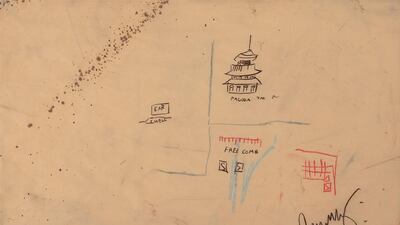The NFT of a drawing by Jean-Michel Basquiat has been withdrawn from auction after the artist’s estate spoke out against the sale.
On Monday, Basquiat's Free Comb with Pagoda, a mixed-media work on paper from 1986, was put up for auction on OpenSea, an online marketplace for NFTs (non-fungible tokens), sponsored by a firm called Daystrom.
Bidding was set to start at one Ethereum, or about $2,500. The winning bid would have given the buyer access to a token of the work, as well as its IP and copyright.
There was another detail about the sale that raised eyebrows – the buyer would then have the option to “deconstruct”, or destroy, the physical work after purchase, with only the NFT remaining.
On Wednesday, however, the work was withdrawn from the sale after Basquiat's estate stated the seller does not own the license or rights to the work. Speaking to The Art Newspaper, David Stark, the licensing agent of Basquiat's archive, said: "The estate of Jean-Michel Basquiat owns the copyright in the artwork referenced. No license or rights were conveyed to the seller and the NFT has subsequently been removed from sale."
The estate did not state whether it considers the drawing to be authentic or fake. It was bought in 2015 by an unknown collector. Daystrom claims the work was authenticated by the artist’s estate in 2002. “The original is framed with the authentication on the reverse and is signed 'Lenny' in the lower right corner – a common Basquiat pen-name. There is absolutely zero doubt about authenticity and ownership of the work,” the firm said.
The controversy highlights issues with NFT art, particularly when it comes to copyright and ownership. The buyer for the Basquiat would have been given a "certificate of copyright" to the work, and also have been granted the reproduction rights to the image.
Potential buyers would need to be cautious with the NFT art for sale, ensuring that the artist is the true creator of the work or agreed to the creation of the NFT. In addition, the “ownership” of the NFT is linked to the existence of the certificate on the particular platform on which it is sold. However, the question of what happens when the platform is no longer in operation and the link becomes broken remains unanswered.

